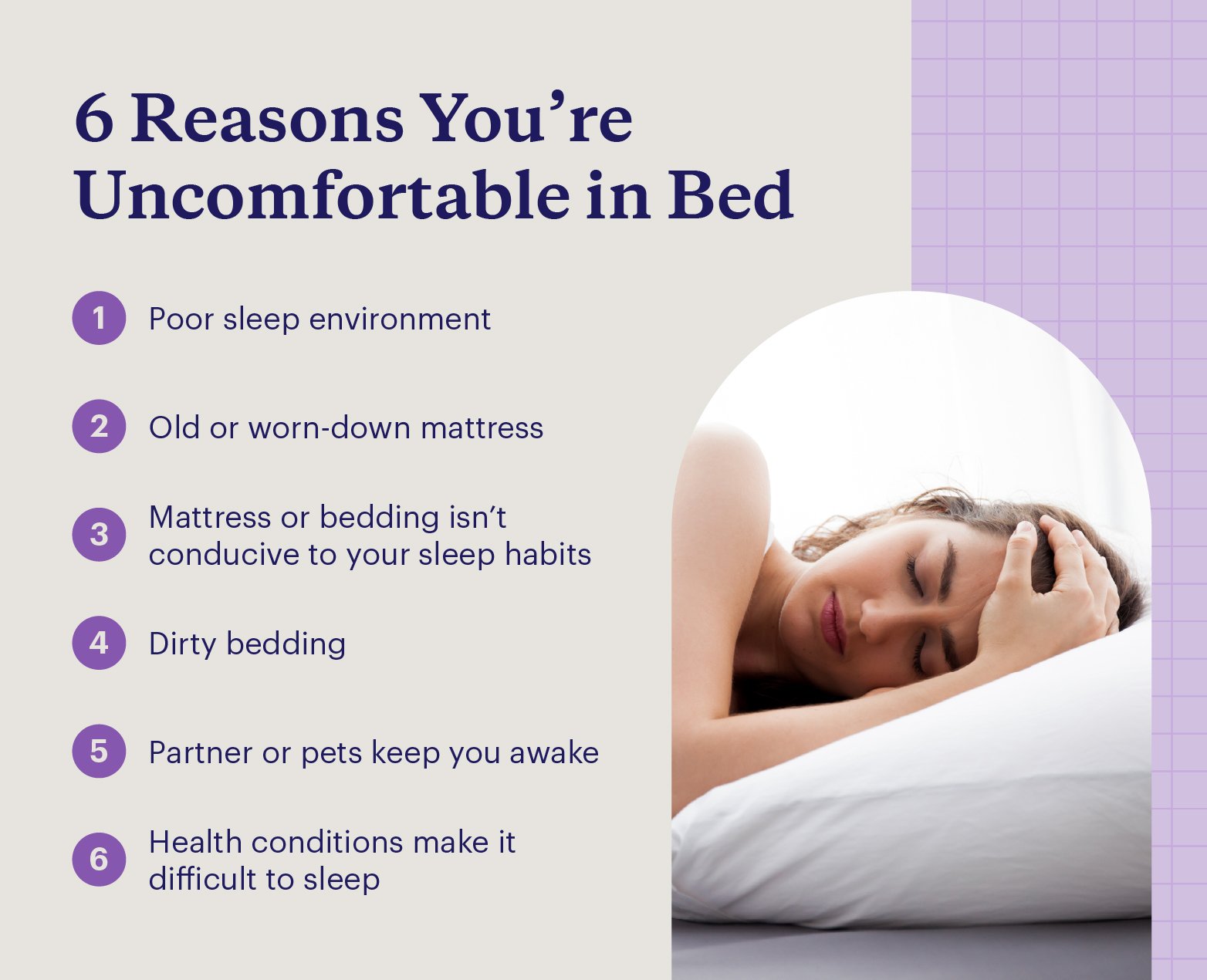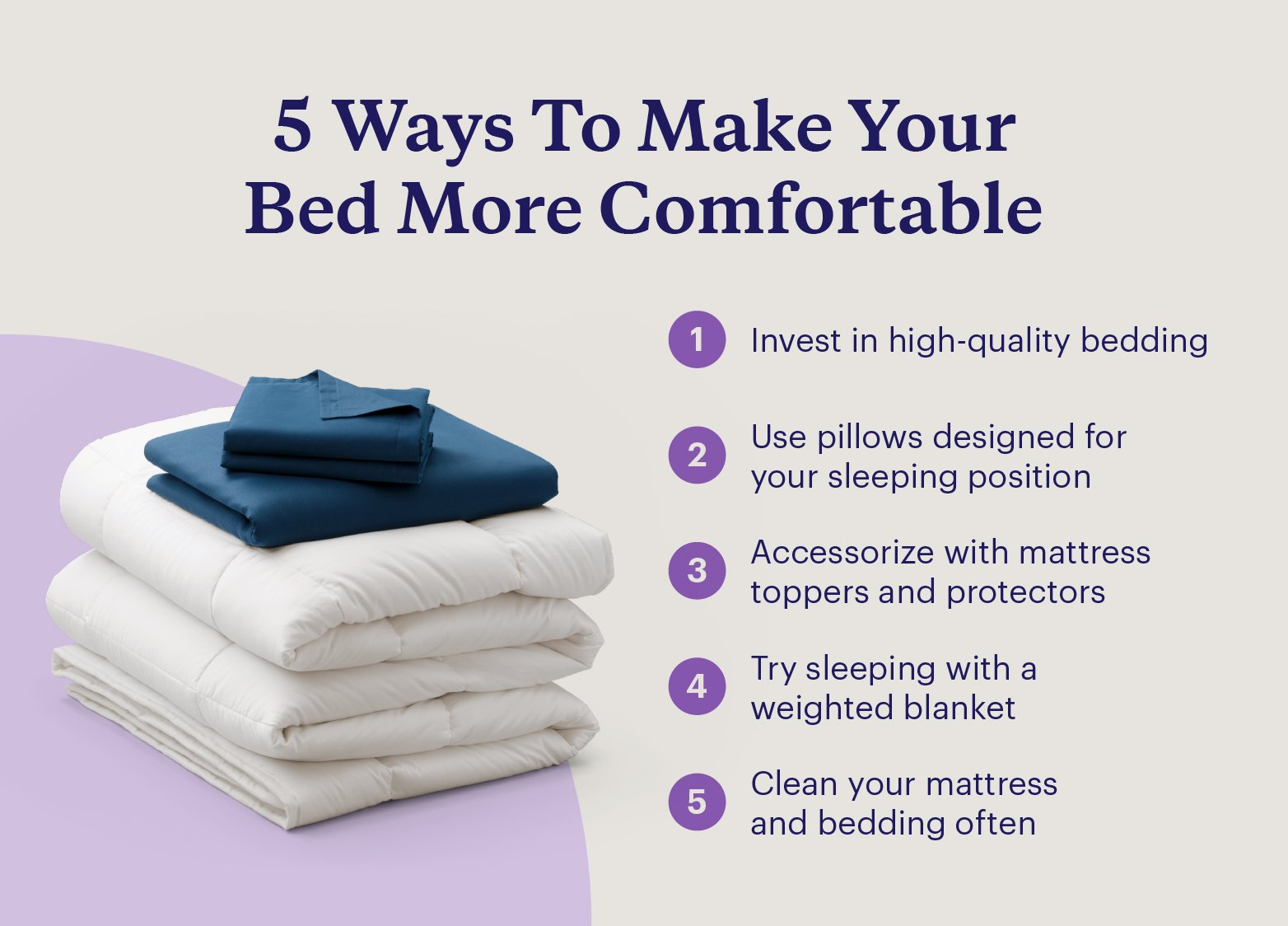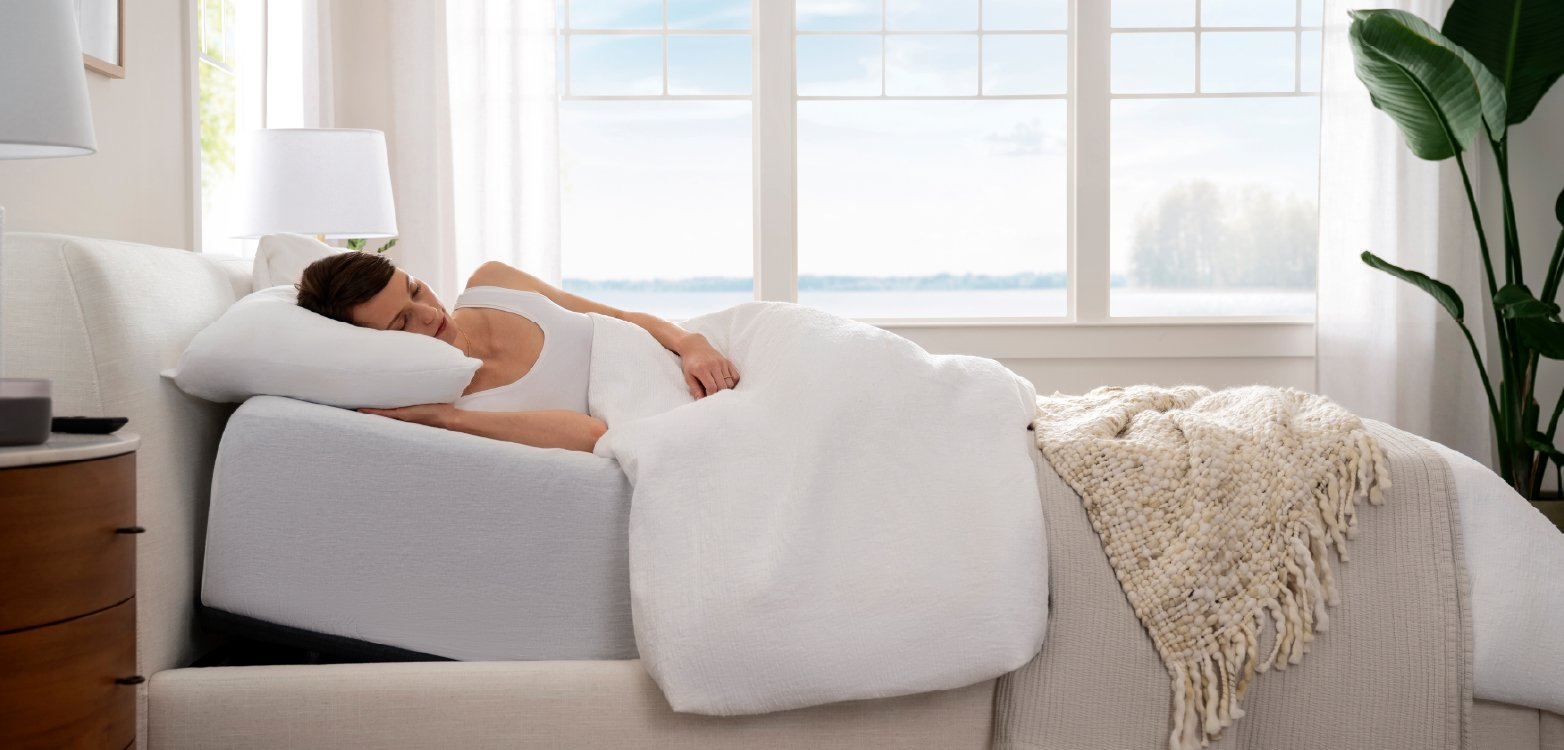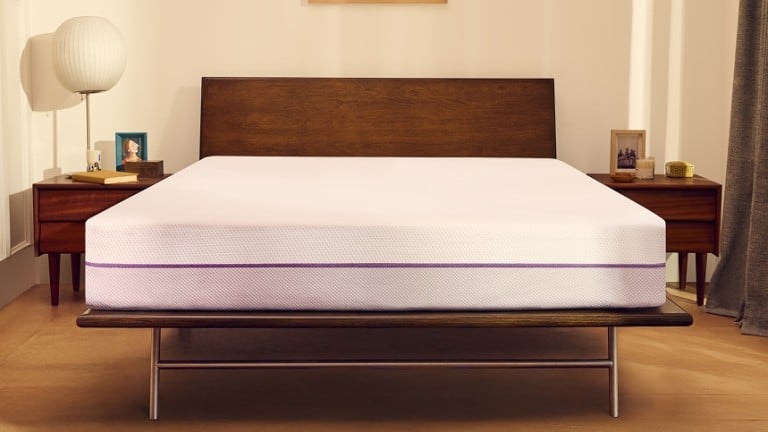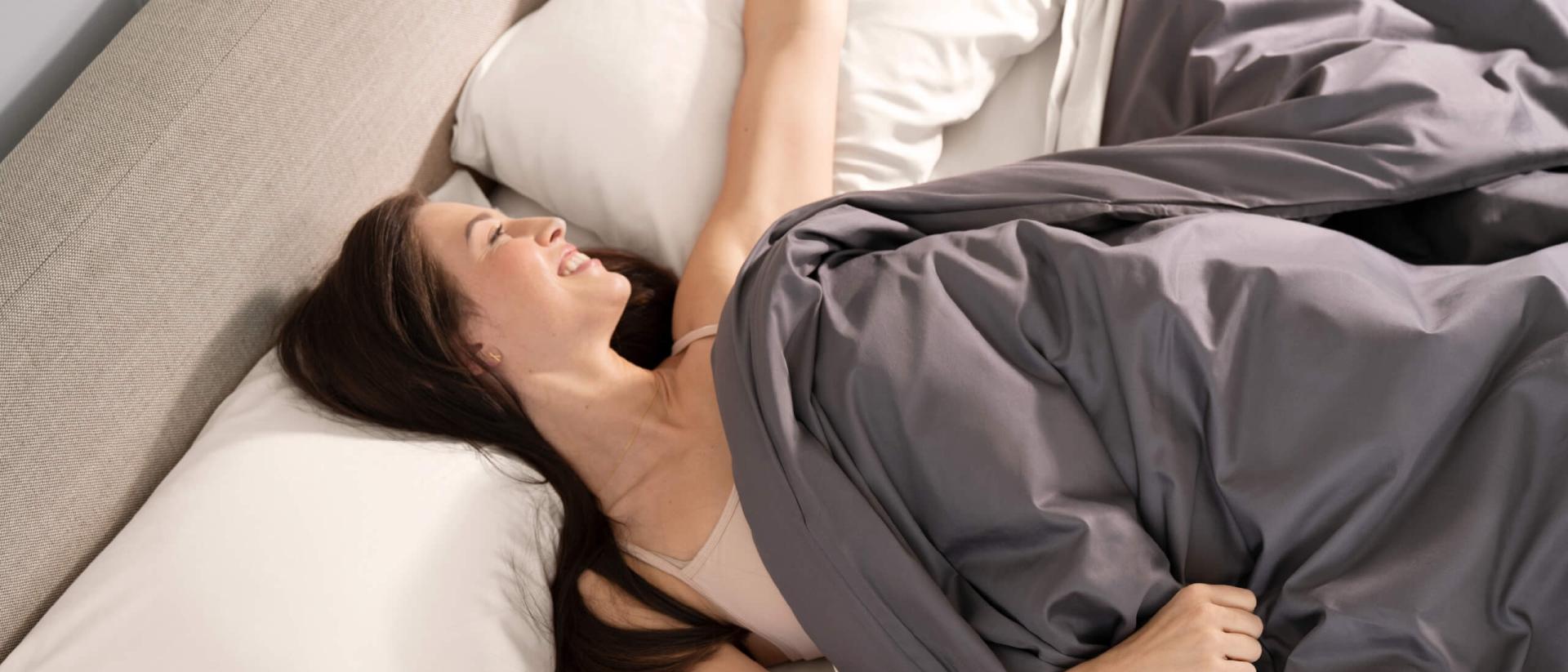
Can't Get Comfortable in Bed? 23 Tips for Better Sleep
Can’t get comfortable in bed? Poor sleep can leave you tired in the morning, unable to focus on the day ahead. Improving your sleep quality is a sound investment in your physical and mental health.
Can’t get comfortable in bed? You’re not the only one. In fact, 39% of Americans struggle to fall or stay asleep.
One of the most common reasons for poor sleep is the mattress you sleep on. A good mattress supports your body, relieves pressure, and helps you get a good night’s sleep. If your bed has become harder to snuggle into, it’s time to get to the underlying cause. Your physical and mental well-being will thank you.
Follow along to understand why your bed is no longer comfortable and what you can do to change it.
Why Can’t I Get Comfortable in Bed?
You may suddenly find your bed uncomfortable for various reasons — from issues with your bedroom environment to the mattress itself. Here are some common issues:
- Bedroom is too bright or loud
- Old or worn-down mattress that needs to be replaced
- Pillow doesn’t fit your sleeping needs
- Mattress or bedding makes you too warm or cool
- Mattress or bedding needs to be cleaned
- Partner or pets keep you awake
- Health conditions that make it difficult to sleep, like pregnancy, restless leg syndrome, or asthma
Why Your Bed Feels More Comfortable in the Morning
If your bed feels better and comfier in the morning, this may be due to melatonin, the hormone that regulates our sleep-wake cycles. Our bodies produce melatonin right before and during sleep to promote sleep.
As soon as you wake up, your body stops making melatonin. However, melatonin takes time to dissipate, so there are still traces of it in your body in the morning. This is why you feel so relaxed and comfy upon waking and want to stay a little longer in bed — but if you also wake up tired, you might be struggling with sleep inertia or another condition.
23 Tips for Getting Comfortable + Sleepy Before Bed
There are few things as frustrating as an uncomfortable mattress after a long, exhausting day. If you’re sick of tossing and turning in the hopes of getting comfortable in bed, fall asleep fast with these 23 tips for relaxing at night and creating a sleep-inducing oasis.
1. Reassess Your Mattress
If you can’t get comfortable in bed and your mattress is showing signs that it’s on its last leg, it’s time for a new one. Mattress support and comfort layers naturally wear over time, ultimately creating a platform that causes aches and pains — this makes achieving a good night’s rest nearly impossible.
Mattresses aren’t a one-size-fits-all purchase. Not all beds provide the same level of support, and materials play a significant role in how supportive a mattress can be. Purple’s hybrid mattress and our innovative GelFlex® Grid instantly adapts as you shift positions throughout the night, providing pressure relief exactly where you need it.
Support is subjective, so be sure to read our guide on how to choose a mattress based on your needs.
2. Determine What Type of Sleeper You Are
How you sleep is one of the greatest determinants of what type of mattress will be best for you. Your preferred sleeping position, body weight, and whether your body runs warm or cool at night can all affect how comfortable a mattress will be for you.
The most common types of sleepers include:
- Side sleepers
- Back sleepers
- Stomach sleepers
- Combination sleepers
A stomach sleeper typically requires a medium to firm mattress to prevent their face from sinking too far into the bed. Take a closer look at mattress firmness, often measured on a scale of 1 to 10, in the table below to determine what option might work for you.
| Soft | Medium | Firm | |
|---|---|---|---|
| Firmness Scale | 1-3 | 4-7 | 8-10 |
| Description | Cloud-like Cradles your body exactly where you need it Feels like a hug | Balanced mix of soft and firm You won’t sink too far into the mattress Some give in the mattress | You feel buoyant as you sleep Has the hardest surface Tends to be cooler than other mattress types |
| Best For | Side sleepers who need pressure relief | Combination sleepers Sleepers who move frequently throughout the night | Combination sleepers Sleepers who move frequently throughout the night |
3. Invest in a Good Mattress Topper
If a new mattress isn’t in your budget, try a mattress topper. A mattress topper is an extra layer of foam — typically about 2 to 4 inches thick — that you can place over your mattress.
There are many different mattress toppers, from gel-infused memory foam toppers that cool down hot sleepers to pillowy toppers that can make a firmer mattress much softer. Whether you want to make your mattress softer or firmer, there is a mattress topper for you.
Unlike other brands, Purple’s mattresses don’t require mattress toppers, as the GelFlex® Grid acts as a built-in comfort layer that works for any sleeping position. Adding a separate mattress topper may negate the comfort of the Grid.
4. Invest in a Pillow Made for Your Sleeping Position
The pillow you’ve slept with for the last three years may not support your head and neck, causing you to toss and turn at night. Choose the right pillow for your sleeping style so the upper part of your body is comfortably aligned. Here are some tips for each sleeping position:
- Back sleepers: Choose a soft and flat pillow for your head, and stuff a pillow under your knees to bring yourself to a neutral spine position.
- Side sleepers: Opt for a firmer, taller pillow to keep the side of your head comfortably elevated. Choosing the best pillow for side sleepers can help maintain proper spinal alignment and reduce pressure on your neck and shoulders. You may find comfort in placing a pillow between your knees as well.
- Stomach sleepers: Use a very thin pillow so your face doesn’t feel muffled — or consider sleeping without one.
Make sure you know how to sleep properly on your pillow to make yourself more comfortable, as well.
5. Get a Body Pillow
Body pillows are popular among moms-to-be who may need a little help sleeping during pregnancy, but you don’t need to be pregnant to enjoy the benefits of a good body pillow. These giant pillows provide side sleepers additional support and comfort by offloading pressure from your hips, shoulders, back, and neck.
Body pillows are also an excellent solution for people who snore or suffer from sleep apnea, as they can be used to elevate your head and neck for a safer and more comfortable breathing position. They’re also useful for people recovering from surgery or an injury requiring them to sleep in a position that would otherwise be uncomfortable without the added support.
6. Keep Your Mattress and Bedding Clean
There’s nothing better than climbing into fresh, crisp sheets at the end of a long day. If your bed becomes suddenly uncomfortable, think about the last time you refreshed your bedding. Dust mites, pet dander, and even odorous stains can exacerbate allergies, which can keep sleepers from enjoying a restful night’s sleep.
Sleep tip: Wash and change your linens at least once a week to remove these particles, breathe easier at night, and sleep more comfortably. It’s also recommended to vacuum and clean your mattress every three to six months. You should also plan to wash your pillows at least once or twice a year.
For spills, stains, and deodorizing your mattress, there are plenty of cost-effective home remedies to try separately, like:
- Lemon juice
- Borax
- Vinegar
- Baking soda
7. Buy Quality Bedding and Pillows
There’s a reason many people obsess over thread count — comfortable sheets can mean the difference between deep sleep and lying awake all night because the bed is too hot or itchy. A cozy comforter or duvet can also make sleeping feel more luxurious, even if you’re just at home and not staying in a five-star hotel.
There is no one-size-fits-all material for bedding. Figuring out how to buy bed sheets means considering your unique needs and preferences for factors like breathability and material. That said, bamboo, linen, and cotton sheets are generally soft and breathable, while flannel sheets are warm and perfect for cold winter nights.
8. Try Mattress Protectors
Thinner than a mattress topper, a mattress protector is a thin, water-resistant layer that fits on top of your mattress like a top sheet. These machine-washable covers are designed to keep dust, dirt, and liquids from penetrating your mattress — so you don’t have to worry about vacuuming your mattress as often.
While using a mattress protector won’t make your bed softer, they can prevent skin irritation and allergies by keeping allergens from building up inside your mattress.
Keep in mind, if you have a Purple mattress, buying a mattress protector with stretch is key. The Purple Mattress Protector is made of a spandex, polyester, and TPU blend to fit mattresses up to 15 inches without sacrificing comfort. Plus it stays quiet as you change sleeping positions throughout the night.
9. Get a Weighted Blanket
Weighted blankets have risen in popularity in recent years –– and for good reason. Studies show that weighted blankets can reduce stress and restlessness thanks to the effects of deep pressure stimulation, helping anxious sleepers get the rest they need.
Weighted blankets can be a great temporary solution for people who may find it hard to sleep, as they encourage your brain to release calming, sleep-inducing hormones that’ll help you drift off to sleep faster.
Sleep tip: Cocoon yourself in layers of soft, organic fabric with Purple’s hand-knit Bearaby® Weighted Blanket. Unlike some weighted blankets that can be hard to wash or trap too much body heat, the Bearaby® Weighted Blanket is made of soft, hand-knit sustainable fabric that encourages airflow.
10. Flip or Rotate Your Mattress
If you want to make an old mattress firmer without spending a dime, try flipping or rotating it first. Mattresses naturally sag and become uneven over time, but flipping and rotating them regularly can help mattresses wear more evenly. This also lets you sleep on the side with less wear and sagging, making for a more comfortable night’s sleep.
Be sure to check with your mattress manufacturer first. While most can be rotated, not all mattresses are flippable. Most polyfoam and innerspring mattresses can be flipped, but mattresses with pillow tops, as well as most hybrid, memory foam, and latex mattresses, are one-sided only.
11. Cut Your Screen Time
Many people scroll endlessly online while waiting to fall asleep. However, this late-night doom scrolling might actually be causing you to toss and turn even after you set your phone down. Blue light from your devices can disrupt your body’s melatonin production, tricking your mind into thinking it’s not time to sleep.
Sleep tip: At night, keep your cell phone and other mobile devices off or away from your bed for at least an hour before going to sleep. Over time, your body will adjust and you’ll fall asleep sooner.
12. Reduce and Time Your Caffeine Intake
Caffeine takes approximately eight hours to leave your body, so that mid-afternoon cup of joe may keep you from falling asleep at night. As a result of falling asleep later, you’ll wake up groggy and sleep-deprived. This vicious cycle will have you reaching for more caffeinated beverages just to keep you going through the day.
Sleep tip: Limit your caffeine consumption to morning hours so you don’t feel buzzed and unable to sleep by bedtime. You might also consider gradually reducing your overall caffeine intake, like going from two cups to just one cup of coffee a day.
13. Don’t Eat Too Close to Bedtime
Food activates your digestive system. If you eat a full meal late at night, your muscles will be too busy metabolizing your food instead of resting, which may make it harder for you to fall asleep. Some foods can help you sleep better, but it's best to eat them well before you lie down.
Sleep tip: Experts suggest eating a heavier lunch earlier in the day followed by a lighter dinner. This gives your body the fuel it needs and keeps the hunger pangs away while allowing you to digest your food fully before bed.
14. Set a Consistent Bedtime
By going to bed and waking up at roughly the same time every day, you train your brain to release melatonin and your body’s internal clock to “kick in” naturally as the hour approaches. Your body will adapt over time, allowing you to hit the ground running as soon as you wake up.
If you don't know when you should go to sleep, try using a sleep calculator to set your ideal sleep schedule.
Sleep tip: Set an alarm to remind you when to start your bedtime routine. Give yourself one or two hours before falling asleep to wind down. For example, if you need to fall asleep by midnight to get your eight hours, get ready for bed by 10 or 11 p.m.
15. Use a Sound Machine
Sometimes, it can be harder to fall asleep in a silent bedroom than on a busy airplane. One reason for this may be the white noise that hums from an airplane’s cabin.
Sleeping with a sound machine can help quiet racing thoughts, minimize the harshness of your partner’s snoring, and block any sudden background noises. Not only can it help you fall asleep faster, but sound machines can also help you stay asleep.
16. Try Light Stretching and Meditation
If you have sleeping problems, light stretching might help you drift off more quickly. Stretching improves your blood flow, which helps your body release the tension that’s built up throughout the day so you can relax and settle into your bed more comfortably.
Meditation is another pre-bedtime practice that can help you nod off faster. If you often struggle to sleep because you’re preoccupied with the day’s events or random thoughts, mindful meditation can help you clear your mind from distractions.
Sleep tip: Try a meditation app for guided practice designed to help you fall asleep faster.
17. Change Up Your Pajamas
What you wear to bed can affect how comfortable you are, just like your sheets. The right pajamas for you ultimately depend on your sleep patterns and environment. Some of the most common and preferred pajama materials based on sleeping patterns are:
- Hot sleepers: bamboo, cotton, polyester, micromodal, linen, satin, or silk
- Cold sleepers: flannel, knit, wool, or fleece
- Frequent movers: bamboo, satin, or silk
Your pajamas and sheets should complement each other to avoid annoying clinging or tangling as you move throughout the night. If you move around in your sleep, avoid loose pajamas that bunch, pull, or ride up.
18. Try a Weighted Eye Mask
Weighted eye masks equally distribute weight across the face and eyes to promote relaxation. Similar to weighted blankets, weighted eye masks use deep pressure relief to help relieve head and facial discomfort from migraines or sinus infections.
By sleeping with an eye mask, you’re also creating a pitch-black environment to encourage sleep. However, be sure to double-check with your doctor before using a weighted mask, as they may not be safe for those with some eye conditions.
19. Install Blackout Curtains
Blackout curtains aren’t just for baby nurseries and night-shift workers. If you can’t get comfortable sleeping with an eye mask, you can darken your bedroom by hanging blackout curtains over your windows. This can make a huge difference, especially during the summer months when the sun rises early and sets late.
20. Adjust Your Room Temperature
Do you find yourself reaching for a thicker blanket or tossing off covers in the middle of the night? If your room is too hot or too cold, this may disturb your ability to get comfortable.
The recommended temperature for sleep is 66 to 69 degrees Fahrenheit, but it varies from person to person. Check your thermostat and adjust as needed. Also consider swapping your blankets out for the season — use a thicker comforter for colder months and a thinner quilt for the summer.
21. Diffuse Essential Oils
Have you ever been to a spa? Think back to what they used to set a relaxing scene. Beyond the spa music, they likely diffused essential oils — the ancient practice of aromatherapy.
Smells have a direct connection to the brain, and some scents are said to elicit specific responses, like calming the body. To create a relaxing, more comfortable environment, you could diffuse oils like lavender, chamomile, vanilla, or jasmine.
22. Try Sleep Supplements
Some people find success with sleep supplements when improving their sleeping environment doesn’t bring relief. But with so many sleep supplements on the market today, deciding what’s right for you can be overwhelming.
Some of the most popular options include:
- Melatonin
- Magnesium
- Valerian
- CBD
- GABA
- Tart cherry juice
- Antihistamines (short-term use only)
- Over-the-counter sleep aids (short-term use only)
These sleep supplements are commonly found in teas, capsules, or tinctures. Always consult your doctor first before trying any new supplements.
23. Get a Sleep Test
When all else fails, you may consider asking your physician for a sleep study to rule out any sleep disorders. For example, if you suspect you’re facing sleep apnea symptoms, a sleep study can assess your sleep health and confirm a diagnosis.
An annual physical may also be a good idea to fully review your health to uncover any potential concerns that could be interfering with your sleep.
Get a Good Night’s Sleep on a Comfy Mattress
If you can’t get comfortable in bed, there’s a strong chance your mattress isn’t relieving your body’s pressure points. Save yourself sleepless nights and replace your mattress with the right one for your sleeping style. With plenty of support, you’ll wake up well-rested and feeling better overall.
Upgrade today to a Purple GelFlex® Grid mattress for a comfortable night’s sleep
More to Explore
Level-up your sleep routine with our most-loved products.

